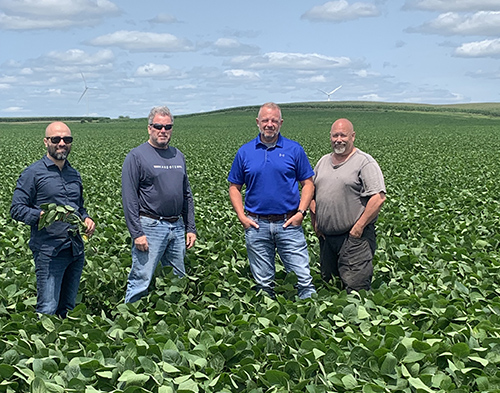

Interview: Bruce Bennett
Benson Hill is leveraging its food science, data science, and plant science technology platform, CropOS, to drive innovation in plant-based proteins and oils. Here, the company’s President of Ingredients, Bruce Bennett, takes us on a more in-depth tour of the company’s journey to design ingredients that harness the natural genetic diversity of plants
Bruce Bennett, an industry veteran, has a rich background in specialty ingredients and building high-performing growth platforms. Prior to joining Benson Hill, he spent almost 25 years at ADM, where he focused on nutraceuticals, fibers, emulsifiers, and the global protein business spanning soy, pea, and specialty grains.
“I’ve had a lot of experience and exposure,” says Benson Hill’s President of Ingredients. “And I’ve had the opportunity to see all of the emerging trends and opportunities over the past several decades that impact our industry today.”

Benson Hill sits at the forefront of food innovation, driven by ‘CropOS’ – a proprietary technology platform powered by AI, which combines computational biology, machine learning, and big data analysis to accelerate the development of improved crops. “Our mission is to set the pace of innovation in food by leveraging our genetics, and that’s where our CropOS platform comes into play,” Bennett adds.
So, what, specifically, does CropOS do? Well, it enables researchers and breeders to efficiently analyze vast amounts of genomic data, including genetic sequences and traits, to identify valuable genetic variations. By understanding the genetic makeup of crops in detail, it helps breeders select the most promising genetic combinations to enhance traits such as yield, nutritional content, flavor, ingredient functionality, and lower sugars such as raffinose and stachyose.
One of its key advantages is its ability to generate precise predictions for plant breeding. By using machine learning algorithms and sophisticated models, it can predict how different genetic combinations will affect a plant’s phenotype and observable traits.
That’s a huge boon as it saves significant time and resources by guiding breeders toward the most productive genetic pathways for end-use ingredients, reducing the trial and error traditionally associated with crop improvement.
We want to not only provide high-quality, great-tasting, highly functional, soy protein ingredients, but we want to do so in a way that reduces any adverse impact on the environment, such as reduced greenhouse gas emissions and water usage
Moreover, CropOS promotes sustainability by facilitating the development of crops with increased resource-use efficiency, especially in the nutritional makeup of the bean itself. For instance, boosting the in-the-grain protein in the soybean can displace a resource-intense processing step for protein concentration. That means a soy flour can essentially act as a soy protein concentrate for food formulations, reducing GHG emissions by half and conserving 70% more water when compared to commodity soybeans.
“CropOS essentially guides us and our development,” Bennett adds. “We start first with customer insights, diving into the challenges that the industry might be facing – or immediate needs that might be impacting the food system today – and then we feed that into our CropOS models to understand how that capability from a genomic level can help guide our development of our [crop] varieties to provide solutions to some of these problems.
“We’re zeroing in more on how output traits or downstream traits can affect food ingredients, how we can manipulate those to bring value to the food system as opposed to just simply looking at how we increase yield and bring value to the production side.”
Evolution of the alternative proteins market

Alternative proteins, encompassing plant-based options as a pillar, is one of the market sectors that Benson Hill is serving.
Highlighting some of the trends that have shaped the growth of the plant-based protein landscape over the years, Bennett cites factors such as population growth, the demand for convenient foods, the rise of flexitarianism, and urbanization. “These have helped fuel the momentum for a long-term trend and just additional accessibility and viability around the capabilities of plant-based proteins,” he notes. “Having worked with a broad base of different applications, markets and customers, we’ve seen over the course of time the industry respond.”
Certainly, innovation is a very big part of responding to consumer trends. That’s what excites Bennett about innovation at Benson Hill, that they’re “looking at the front end of the system,” and “developing better varieties from the beginning to leverage the current chassis”, and doing so in a much more efficient manner. “Developing higher-protein beans is just one way to produce more value for the ingredients,” Bennett says.
Unique features of Benson Hill’s plant-based proteins
Soybeans have long been a focus for Benson Hill. “One of the biggest challenges with soy over the past few decades has been a focus on yield development rather than quality protein development,” Bennett continues. So, by growing higher-protein soybeans, we produce high-value, high-protein ingredients with characteristics that food companies demand, leading to better cost efficiency and sustainability.
The company’s product range includes high-protein flours, high-oleic oil, low-oligosaccharide soymeal, and textured products that are already being utilized in the industry.
Its ‘Ultra-High Protein’ offering was first announced in early 2020 and released for the 2021 crop year. These varieties were the first commercially available soybeans to effectively replace soy protein concentrate via typical soybean crushing, in doing so helping food companies to eliminate energy and water-intensive processing steps across the consumer food, animal feed, and aquaculture markets.
The company utilized its CropOS platform to optimize the nutritional profile and functional properties of the protein, making it suitable for a wide variety of food applications.

“Certainly, our initial goal was to look at how we can impact the food system in a more sustainable way,” Bennett explains. “That certainly underpins everything we do here. We want to not only provide high-quality, great-tasting, highly functional, soy protein ingredients, but we want to do so in a way that reduces any adverse impact on the environment, such as reduced greenhouse gas emissions and water usage. So, by leveraging our Ultra-High Protein soybeans, today we’re able to produce very similar products to those currently on the market, yet with measurable reductions in greenhouse gases and water usage. It’s an added-value proposition around sustainability, which is desired by many of our customers such as Kellogg’s and its MorningStar Farms line. They have their own sustainability goals, and they can leverage our ingredients to help them not only make great-tasting downstream food products but also do so much more sustainably.”
Closed-loop ingredient model and vertical integration
Benson Hill’s closed-loop ingredient model is a critical differentiator for the company. “Traditionally, one of the challenges has been that it’s often been hard to get past the farm gate,” Bennett suggests. “You need to be able to demonstrate to your farmer partners that it’s valuable for them to grow these types of varieties, and that there may not necessarily be yield benefits in there for them, but there’s a better margin potential.”
Essentially, what vertical integration does is ensure that the economic benefits of the end ingredients are properly communicated and distributed among farmers, processors, and food manufacturers, as Bennett clarifies in more detail. “There are opportunities to manage that margin across the supply chain and redistribute that effectively, so the farmer can benefit, the processor can benefit, and the downstream CPG (your food manufacturer) can also benefit,” he says. “With us connecting them, we’re able to ensure that those economics flow freely, and that the benefits of the genetics are properly explained and pulled through the supply chain.”
Sustainability considerations
Sustainability remains at the heart of Benson Hill’s mission, and the company employs various strategies to address environmental impacts and resource efficiency.
Bennett highlights two key aspects of note. First, it’s about having strong relationships with farmer partners. “They’re a critical piece in this process,” he stresses. “The fact we’re able to manage and collect all of the data that is associated with their production is crucial as we’re assessing sustainability impacts that we can offer ‘as a service’ to our partners downstream on the food side, where that data is required to help demonstrate sustainability impacts and benefits.”
The second aspect is the soybean variety itself, specifically how Benson Hill is developing better beans from the start. “With better output traits, whether it’s higher protein, or lower sugars that can impact flavor, all of this is happening,” Bennett reports. “And we’re enabling that with Mother Nature doing the heavy lifting, as opposed to downstream processing. We’re negating processing steps, avoiding the build of expensive plants, and reducing water and energy usage that’s necessary, historically, to remove or eliminate elements like sugars, to be able to get to the same endpoint.”
Benson Hill’s closed-loop model also ensures integrity and better traceability in the supply chain. The company knows its farmers, and most varieties are identity-preserved as they become ingredients. “We take this very seriously,” Bennett says. “It enables us to manage the quality, production, and traceability, supporting downstream food partners as they develop better food for the industry.”
Benson Hill’s commitment to certifications such as non-GMO and deforestation-free regulations further reinforces its dedication to transparency and sustainability. “It assures we’re meeting certain certifications globally in conjunction with our customers,” Bennett says. “Many of our varieties are Proterra-certified, so have undergone very rigorous reviews, with global standards around identity preservation, non-GM status, and so on. Deforestation is especially critical, not just here in the USA, but around the world where government regulations and oversight are being ratcheted up to ensure products are produced and grown sustainably and ethically. Working with our customers, we validate the specific data that they require and, in turn, we’re making sustainability measurements easier for them.”
I think the way we view protein adoption and acceptance is that it’s not necessarily an either-or when it comes to plant-based or meat-based
Benson Hill’s CropOS system also plays a pivotal role in optimizing the nutritional quality and flavor of its proteins. “There are billions of data points the system monitors and tracks to produce better varieties that address consumer traits and downstream nutrition,” says Bennett. The company focuses particularly on eliminating certain sugars and enhancing flavor and gut compatibility, resulting in high-quality ingredients that are suitable for various foods.
Embracing alternative proteins
Looking to the future, Bennett remains pragmatic when it comes to the outlook for alternative proteins. We humans love animal-based proteins – so much so that in 2020 we ate 574 million metric tons’ worth of meat, seafood, dairy, and eggs, equating to almost 75kg per person. A mere 13 million metric tons of alternative proteins were consumed globally in the same year, just 2% of the animal protein market.
Does Bennett envisage the tide turning significantly at any point? “Over the past 30 years, one of the biggest areas of protein consumption has been in tandem with the meat industry,” he says. “I think the way we view protein adoption and acceptance is that it’s not necessarily an either-or when it comes to plant-based or meat-based,” he says. “It’s about how you improve food: how do you deliver higher-quality food? And one way of doing that is through plant-based foods.”
Bennett suggests another way of doing that – and this certainly appeals to many flexitarians – is proteins working together. “And we’ve seen how supplementing a meat formulation with a soy protein can actually improve succulents, and sensorial qualities, due to the moisture retention that occurs when you include soy protein along with a meat protein,” he explains. “We’ve seen in the beverage industry how protein blends that maximize the uptake of whey protein along with the satiety effects of a soy protein in tandem can be very effective and valuable for the consumer.”

“So, long term, Bennett says it’s about food tasting good and having high nutritional value. As long as it’s meeting the sustainability goals of the consumer, he sees those as reasons to believe in continued growth for the protein industry.
“It’s extremely cool,” concludes Bennett, “for someone who comes from a deep processing background like myself to be able to walk up a couple of flights of stairs and sit with the CropOS team as they’re managing and manipulating their plant science, data science and food science through AI and, developing food through that type of a lens to sit back and, and talk through my perspective as an operator. How do we marry these capabilities to have a dynamic and major impact on food? And it’s not necessarily what can we do – it’s what should we do? Those questions are ones that we review together. That’s really exciting, and it’s why I get up and come to work every day.”
If you have any questions or would like to get in touch with us, please email info@futureofproteinproduction.com
More Features

Feeding change

Protein Pioneer: Kesha Stickland








